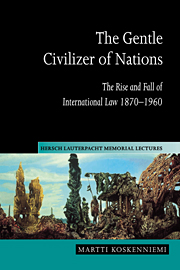Book contents
- Frontmatter
- Contents
- Preface
- List of abbreviations
- Introduction
- 1 “The legal conscience of the civilized world”
- 2 Sovereignty: a gift of civilization: international lawyers and imperialism, 1870–1914
- 3 International law as philosophy: Germany 1871–1933
- 4 International law as sociology: French “solidarism” 1871–1950
- 5 Lauterpacht: the Victorian tradition in international law
- 6 Out of Europe: Carl Schmitt, Hans Morgenthau, and the turn to “international relations”
- Epilogue
- Bibliography
- Index
Preface
Published online by Cambridge University Press: 06 July 2009
- Frontmatter
- Contents
- Preface
- List of abbreviations
- Introduction
- 1 “The legal conscience of the civilized world”
- 2 Sovereignty: a gift of civilization: international lawyers and imperialism, 1870–1914
- 3 International law as philosophy: Germany 1871–1933
- 4 International law as sociology: French “solidarism” 1871–1950
- 5 Lauterpacht: the Victorian tradition in international law
- 6 Out of Europe: Carl Schmitt, Hans Morgenthau, and the turn to “international relations”
- Epilogue
- Bibliography
- Index
Summary
The essays in this book are inspired by many sources and reflect various conversations I have had with international lawyers in the course of the past four years or so. The initiator of the idea of the book was Professor Sir Elihu Lauterpacht, who kindly invited me to give the Sir Hersch Lauterpacht Memorial Lectures at the University of Cambridge in 1998, and in that connection pointed out that this privilege also involved a commitment to prepare the lectures for publication. Eli's hospitality in Cambridge in 1997 and the discussions I had with him also underlie my interpretation of his father's work in chapter 5. As always, I am indebted to Professor David Kennedy from the Harvard Law School for innumerable conversations and collaborative projects, Dighton weeks and weekends, shorter and longer periods together and in wider company in the Boston area, Helsinki and other places, at various stages of writing of these essays. But the only person to have read the whole of this work, and whose comments and criticisms are reflected on every page, as in everything about its author, is Tiina Astola. This book would not exist without them.
Many other friends and colleagues have been involved. The comments and work of Dr. Outi Korhonen are reflected in the description of the culture of late nineteenth-century internationalists.
- Type
- Chapter
- Information
- The Gentle Civilizer of NationsThe Rise and Fall of International Law 1870–1960, pp. xi - xiiiPublisher: Cambridge University PressPrint publication year: 2001

